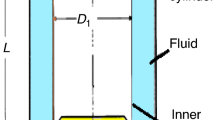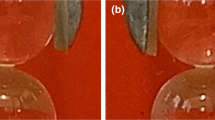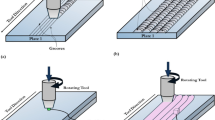Abstract
In order to explore the effect of kinematic viscosity of base oil on the rheological properties of magnetorheological (MR) grease, MR grease samples containing 70% (mass fraction) carbonyl iron powder and carrier liquid separately with kinematic viscosity of 10 mm2/s, 100 mm2/s, 350 mm2/s and 500 mm2/s were prepared. The influence of kinematic viscosity of carrier liquid on the settlement performance of MR grease was analyzed. The rheological properties of MR grease were tested and analyzed under steady-state shear and oscillatory shear modes. The results show that the kinematic viscosity of base oil has a significant effect on the settling stability of MR grease. The zero-field viscosity of MR grease increases with the increase of the kinematic viscosity of the base oil, and the sedimentation performance is better. The colloid stability of MR grease is poor after the kinematic viscosity of base oil is lower than a threshold, and static oil bleed will occur immediately. In addition, the shear stress of MR grease increases with the increase of magnetic induction. When the shear rate is less than 10 s−1, the shear stress increases rapidly with the increase of shear rate. When the shear rate further increases, the shear stress tends to a stable value. The reason is that the thickener fibers in MR grease are subjected to the shear stress between laminar flows, the entanglement occurs, which makes MR grease exhibit shear thinning, and its rheological properties conform to the Herschel-Bulkley constitutive model. In the process of preparation, some carbonyl iron powder will be embedded into the thickener fiber, which shows different magnetic saturation phenomena due to shear thinning under steady-state shear and oscillatory shear.
摘 要
为了获得低零场黏度且抗沉降性能优异的磁流变脂, 制备了羰基铁粉质量分数为70%, 基础油运动黏度分别为10 mm2/s、 100 mm2/s、 350 mm2/s和500 mm2/s的复合锂基磁流变脂(MR grease). 研究了基础油运动黏度对MR grease沉降稳定性的影响, 并在稳态剪切和振荡剪切的模式下测试分析了MR grease的流变特性. 结果表明, 基础油的运动黏度对MR grease的沉降稳定性有明显影响, 即基础油的运动黏度越大, 所制备的MR grease的零场黏度越大, 沉降稳定性越好. 此外, MR grease的剪切应力随磁感应强度的增强而增大; 当剪切速率小于10 s-1, MR grease的剪切应力随剪切速率的增加而迅速增大, 进一步增大剪切速率时, 剪切应力趋于一稳定值. 由于MR grease中稠化剂纤维受到层流间剪切应力的作用, 发生解纠缠使得MR grease表现出剪切稀化现象, 其流变特性符合赫谢尔-巴尔克莱本构模型. 制备过程中部分羰基铁粉会嵌入到稠化剂纤维中, 在稳态剪切和振荡剪切状态下由于剪切稀化的作用显示出不同的磁饱和现象.
Similar content being viewed by others
References
GONCALVES F D. A Review of the State of the Art in Magnetorheological Fluid Technologies-Part I: MR fluid and MR fluid models [J]. The Shock and Vibration Digest, 2006, 38(3): 203–219.
HAJALILOU A, AMRI MAZLAN S, LAVVAFI H, et al. Field responsive fluids as smart materials [M]. Singapore: Springer, 2016.
ASHTIANI M, HASHEMABADI S H, GHAFFARI A. A review on the magnetorheological fluid preparation and stabilization [J]. Journal of Magnetism and Magnetic Materials, 2015, 374: 716–730.
CARLSON J D, JOLLY M R. MR fluid, foam and elastomer devices [J]. Mechatronics, 2000, 10(4/5): 555–569.
RANKIN P J, HORVATH A T, KLINGENBERG D J. Magnetorheology in viscoplastic media [J]. Rheologica Acta, 1999, 38(5): 471–477.
PARK B O, PARK B J, HATO M J, et al. Soft magnetic carbonyl iron microsphere dispersed in grease and its rheological characteristics under magnetic field [J]. Colloid and Polymer Science, 2011, 289(4): 381–386.
ROMAN C, VALENCIA C, FRANCO J M. AFM and SEM assessment of lubricating grease microstructures: Influence of sample preparation protocol, frictional working conditions and composition [J]. Tribology Letters, 2016, 63(2): 1–12.
HE G T, LIAO C R, DENG S G, et al. Mechanism simulation of magnetorheologic grease [J]. Journal of Functional Materials, 2011, 42(3): 550–552, 556 (in Chinese).
KIM J E, KO J D, LIU Y D, et al. Effect of medium oil on magnetorheology of soft carbonyl iron particles [J]. IEEE Transactions on Magnetics, 2012, 48(11): 3442–3445.
MOHAMAD N, MAZLAN S A, UBAIDILLAH, et al. The field-dependent rheological properties of magnetorheological grease based on carbonyl-iron-particles [J]. Smart Materials and Structures, 2016, 25(9): 095043.
SUKHWANI V K, HIRANI H. A comparative study of magnetorheological-fluid-brake and magnetorheological-grease-brake [J]. Tribology Online, 2008, 3(1): 31–35.
HU Z D, YAN H, WANG X M, et al. The effect of cooling profile on the microstructure and rheology of mineral oil-based magnetorheological grease [J]. Journal of Functional Materials, 2014, 45(24): 24082–24086 (in Chinese).
HU Z D, YAN H, WANG X M, et al. The effect of carbonyl iron on the saponification and structure of magnetorheological grease [J]. Journal of Functional Materials, 2014, 45(21): 21045–21049 (in Chinese).
HU Z D, YAN H, WANG X M, et al. The effect of soap content on the rheology of mineral oil-based magnetorheological grease [J]. Journal of Functional Materials, 2015, 46(2): 2105–2108 (in Chinese).
HU Z D, YAN H, GUO X C, et al. Rheological properties and stability of lithium-based magnetorheological grease with damping effect [J]. Acta Petrolei Sinica (Petroleum Processing Section), 2015, 31(1): 166–171 (in Chinese).
HU Z D, ZHAO H J, WANG D W, et al. Effect of carbonyl iron on dynamic rheological properties of lithium-based magnetorheological grease[J]. Materials Reports, 2019, 33(S2): 630–633 (in Chinese).
WANG K J, DONG X M, LI J L, et al. Effects of silicone oil viscosity and carbonyl iron particle weight fraction and size on yield stress for magnetorheological grease based on a new preparation technique [J]. Materials, 2019, 12(11): 1778.
WANG K J, DONG X M, LI J L, et al. Yield dimensionless magnetic effect and shear thinning for magnetorheological grease [J]. Results in Physics, 2020, 18: 103328.
Mobil Grease. Grease static oil bleed [EB/OL]. (2016-02-19). https://www.mobil.com.cn/zh-cn/industrial/lubricant-expertise/resources/grease-static-oil-bleed.
WANG H X, ZHANG G, OUYANG Q, et al. Rheological properties of magnetorheological grease under shear mode [J]. Journal of Shanghai Jiao Tong University, 2019, 53(3): 380–386 (in Chinese).
ZHANG G, WANG H X, OUYANG Q, et al. Study on rheological properties of magnetorheological gel based on silicone and parameter identification of Herschelbulkley model [J]. Journal of Hunan University (Natural Sciences), 2018, 45(6): 62–71 (in Chinese).
Author information
Authors and Affiliations
Corresponding author
Additional information
Foundation item: the National Natural Science Foundation of China (No. 51675280)
Rights and permissions
About this article
Cite this article
Wang, W., Zhang, G., Wang, H. et al. Influence of Kinematic Viscosity of Base Oil on Magnetorheological Grease. J. Shanghai Jiaotong Univ. (Sci.) 28, 676–685 (2023). https://doi.org/10.1007/s12204-022-2438-1
Received:
Accepted:
Published:
Issue Date:
DOI: https://doi.org/10.1007/s12204-022-2438-1




